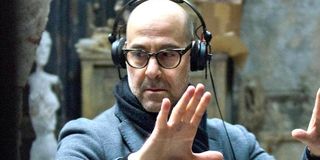Why Stanley Tucci Was A Real Perfectionist While Making His Newest Movie

They say that art is a reflection of life, but in the case of the new movie Final Portrait, director Stanley Tucci found the work had an important effect on him. The film tells the story of legendary artist Alberto Giacometti and his inability to complete a portrait because of his own perfectionism -- and this subject matter wound up having a key impact on its filmmaker. Specifically, Tucci found himself being particularly meticulous in the making of the feature, as I learned during a recent interview:
There were scenes where I just kept doing them over and over again, and would I come back the next day. We had a very tight schedule, but we shot very quickly, and I still had a little bit of time every day extra because we were able to shoot very quickly. I was able to sort of go back and go, 'Okay, guys, we have to go back to scene eight that we did yesterday.' Because the film is very contained, so it's easier for the most part.
Earlier this month I had the immense pleasure of hopping on the phone with Stanley Tucci to talk about his latest directorial effort -- his fifth -- and a considerable part of our conversation was dedicated to the perfectionism ideology. Discussing Final Portrait, I asked if he had been particularly inspired by Alberto Giacometti approach and high standards, and he did not mince words explaining that he took every opportunity he could to go back and reshoot scenes that he felt could be improved. It helped that they were shooting quickly and primarily in one location, and he did everything he could to take advantage of the circumstances.
Adapted by Stanley Tucci, Final Portrait takes audiences back in time to mid-20th century Paris, France, where author James Lord (Armie Hammer) is exhilarated to learn that Alberto Giacometti (Geoffrey Rush) wants him to be the subject of a painting. At first Lord believes it will only take a few days, but those days turn to weeks as the writer finds himself as essentially Giacometti's hostage -- the artist continuing to work and work without ever actually finishing. Ultimately it wasn't Tucci's intention to create the same kind of hostile environment that is depicted in the movie, but that doesn't mean that he didn't find some inspiration in the work habits.
Most of the movie is set in and around Alberto Giacometti's art studio, and this wound up being a major boon for the production and Stanley Tucci's directing habits. While they could spend the entire day filming one scene, it was really effortless to change things around to try and re-do a previous sequence -- with Tucci giving a special shout out to his Final Portrait cinematographer:
So anything in the studio I could shoot basically at any given time I wanted because Danny Cohen lit it so beautifully, so simply... So I'd go, 'Okay, we need to do this again because that didn't work yesterday.' And we do it again! And then the next day I'd go back in and go, 'We have to do that again.' That was very exciting. Eventually you're sort of beating a dead horse, so you have to be careful.
Of course, not everything was that flexible -- but that's just the nature of the business. While Stanley Tucci made it sound like anything filmed in Alberto Giacometti's art studio was easy to return to, the same couldn't be said for all of the footage that was shot when Final Portrait was capturing on-location material while filming around London. Said Tucci,
Obviously when you're on location, especially on a small movie, that's it. You have this limited period of time in the location - when it's over, it's over, and you better have gotten what you wanted.
Thankfully, it all worked out for the best, as Final Portrait is a delight that features wonderful performances from its entire cast. You can now see the film for yourself, as it is currently streaming and available for DigitalHD purchase and on DVD.
CINEMABLEND NEWSLETTER
Your Daily Blend of Entertainment News

Eric Eisenberg is the Assistant Managing Editor at CinemaBlend. After graduating Boston University and earning a bachelor’s degree in journalism, he took a part-time job as a staff writer for CinemaBlend, and after six months was offered the opportunity to move to Los Angeles and take on a newly created West Coast Editor position. Over a decade later, he's continuing to advance his interests and expertise. In addition to conducting filmmaker interviews and contributing to the news and feature content of the site, Eric also oversees the Movie Reviews section, writes the the weekend box office report (published Sundays), and is the site's resident Stephen King expert. He has two King-related columns.
Most Popular






